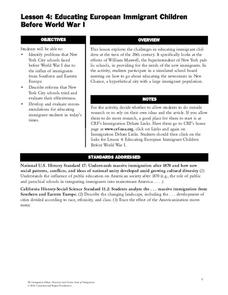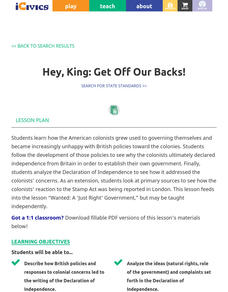Curated OER
What's the Difference Between Procedural and Substantive Due Process?
Students discuss the difference between substantive and procedural due process. They research the uses of due process on the internet and books. They also discuss cases involving students and due process.
Curated OER
The American Revolution: 1775 - 1783
Track the ins and outs and wartime strategies used by both the British and the Americans during the Revolutionary War. Multiple comparisons are made between both factions, maps, statistical data, images, and light text is used throughout...
Constitutional Rights Foundation
Educating European Immigrant Children Before World War I
As if surviving a journey to America wasn't enough of a feat for early 20th century immigrants, they then needed to settle into American life. Learn about the ways New York public education attempted to meet the needs of its students,...
Deliberating in a Democracy
Juvenile Justice
Pupils compare and contrast the legal system as it pertains to juvenile and adult crime and punishment. Incorporating primary documents, legal decisions, and video evidence, individuals form an argument debating the treatment of...
Minnesota Courts
Inside Straight: the Third Branch
Learners use the worksheet as they view the film Inside Straight: the Third Branch. Multiple case studies and the history of the judicial branch of the US government are included via hyperlink and act as the topics of discussion...
Curated OER
Jefferson vs. Franklin: Revolutionary Philosophers
Learners examine the contributions of Benjamin Franklin and Thomas Jefferson to American Independence. In small groups, they conduct Internet research, read and discuss primary source documents, and complete a chart.
Music Publishers Association of the United States
I Made It. I Own It. Please Don't Steal It.
Explore the world of copyright law with a variety of activities to instill the importance of respecting creative property. Scholars watch an animated tale then take part in a grand conversation detailing the video's main idea, details,...
Administrative Office of the US Courts
US v. Alvarez
Is it illegal to lie about military service? Discuss the ways the First Amendment affects the Stolen Valor Act with a lesson that focuses on the Supreme Court case U.S. v. Alvarez. As high schoolers learn more about the history of the...
ProCon
Electoral College
The Electoral College's role in elections is sometimes confusing and controversial. Pupils use a debate topics website to research the pros and cons of the practice to debate whether the United States should still use the Electoral...
Curated OER
History Review: Colonial America
Explore key moments in American history with the click of a mouse! Learners read 50 questions from different eras in early America, and watch the rest of the presentation to find more questions to answer.
Curated OER
An Introduction To Law
Students identify 4 branches of law-criminal, civil, consumer, and family. using a newspaper, they locate examples of how laws affect citizens on a daily basis.
Curated OER
George Washington: The Precedent President
Young scholars investigate precedents set during George Washington's term in office. They conduct Internet research, develop a list of the responsibilities of the President, match Washington's accomplishments with the list, and play a game.
Advocates for Human Rights
The Right to a Clean Environment in the United States
Even if a school has gone digital, chances are there's still plenty of paper being used. The three activities help scholars learn about the environmental impact of paper and another consumer products of their choosing, the issue of...
iCivics
Hey, King: Get Off Our Backs!
Young historians explore the reason American colonists were unhappy under British rule. Class members complete hands-on activities and participate in a group discussions to understand why colonists drafted the Declaration of Independence.
Constitutional Rights Foundation
Conservation, Preservation, and the National Parks
Going green? Scholars investigate the creation of the US National Park program. Through diary entries as well as expert testimony, they synthesize information and analyze the need for conservation and preservation. Finally, they display...
Center for Civic Education
The Power of Nonviolence: Change Through Strategic Nonviolent Action
How did major historical figures, such as Henry David Thoreau, Susan B. Anthony, and Mohandas K. Gandhi, explain and defend their beliefs in nonviolence? Your learners will begin by studying the backgrounds of these individuals, and then...
Curated OER
How to Become a Member of Congress
Students identify requirements for becoming a U.S. Representative or a U.S. Senator, explain procedure for running for representative or senator, and create an informational brochure.
Curated OER
Congressional Moments
Students listen to clips from Congressional Moments radio programs to examine role government plays in our lives, and discuss role of citizens in a representative democracy.
Curated OER
Feudal Japan
An excellent overview of historical Japanese culture, this presentation could carry through a world history unit or a lesson on the history of Japan. Especially interesting are the slides that compare Japanese armor and castles to other...
Alabama Department of Archives and History
What Were They Thinking? Why Some Some Alabamians Opposed the 19th Amendment
To better understand the debate over the 19th Amendment, class members examine two primary source documents that reveal some of the social, economic, racial, and political realities of the time period.
Middle Tennessee State University
Fights, Freedom, and Fraud: Voting Rights in the Reconstruction Era
As part of a study of post Civil War era, young historians investigate the changes in voting rights during the Reconstruction Era (1863-1876), the fraud involved in the Hayes-Tilden presidential election of 1876, and efforts by Pap...
Curated OER
Cartoons for the Classroom: The Bush and Clinton Years
Examine how the Bush and Clinton years are an example of political dynasties. This cartoon provides a way to explore the concept and activate critical thinking skills in order to better grasp U.S. Politics. A fun and educational way to...
Curated OER
Reading Comprehension 6
A great resource for advanced English language learners or native speakers working on reading comprehension. Before reading, discuss different reading strategies. Then, after they read the selection, have your class complete the multiple...
Humanities Texas
Primary Source Worksheet: Thomas Jefferson, Confidential Message to Congress Concerning Western Exploration and Relations with the Indians
A confidential message written by Thomas Jefferson provides readers with an opportunity to practice their reading comprehension skills. The resource, part of a series, includes questions that require a close reading of the message and a...























